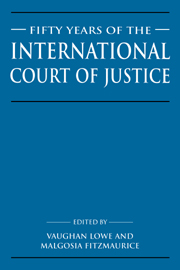Book contents
- Frontmatter
- Contents
- List of contributors
- Preface
- List of abbreviations
- Sir Robert Yewdall Jennings, by Vaughan Lowe
- List of publications of Sir Robert Jennings
- Table of cases
- Part I The International Court of Justice
- 1 The International Court as a world court
- 2 The International Court and the voice of justice
- 3 The London Committee and the statute of the International Court of Justice
- Part II The sources and evidences of international law
- Part III Substance of international law
- Part IV Procedural aspects of the work of the International Court of Justice
- Part V The International Court of Justice and the United Nations
- Index
3 - The London Committee and the statute of the International Court of Justice
Published online by Cambridge University Press: 02 November 2009
- Frontmatter
- Contents
- List of contributors
- Preface
- List of abbreviations
- Sir Robert Yewdall Jennings, by Vaughan Lowe
- List of publications of Sir Robert Jennings
- Table of cases
- Part I The International Court of Justice
- 1 The International Court as a world court
- 2 The International Court and the voice of justice
- 3 The London Committee and the statute of the International Court of Justice
- Part II The sources and evidences of international law
- Part III Substance of international law
- Part IV Procedural aspects of the work of the International Court of Justice
- Part V The International Court of Justice and the United Nations
- Index
Summary
INTRODUCTION
The history of the evolution of the Statute of the International Court of Justice through the work first of the United Nations Committee of Jurists in Washington in 1944 and thereafter of Commission IV of the United Nations Conference on International Organization in San Francisco in 1945 is well documented. The initiative in 1943-4 of the Informal Inter-Allied Committee on the Future of the Permanent Court of International Justice (hereafter the London Committee) is not so well known. This chapter seeks to describe this initiative and to assess its influence during the preparatory work of the Statute of the International Court of Justice.
THE PERMANENT COURT IN EXILE
On the German invasion of the Netherlands in May 1940, J. G. Guerrero, the President of the Permanent Court of International Justice, J. L. Oliván, its Registrar, and three officials moved from The Hague to Geneva. Of the other judges, those who were able to return to their countries of origin did so, including the judge of British nationality, Vice-President Sir Cecil Hurst. The war had already seriously affected the finances of the League of Nations. Its budget for 1940 imposed salary cuts on the judges, a measure with which the judges had agreed. It was now proposed in the budget for 1941 to reduce still further the allocation for the Court. To this end the report of the League's Supervisory Commission appealed to ‘the spirit of understanding’ which the judges had already shown.
- Type
- Chapter
- Information
- Fifty Years of the International Court of JusticeEssays in Honour of Sir Robert Jennings, pp. 40 - 60Publisher: Cambridge University PressPrint publication year: 1996

